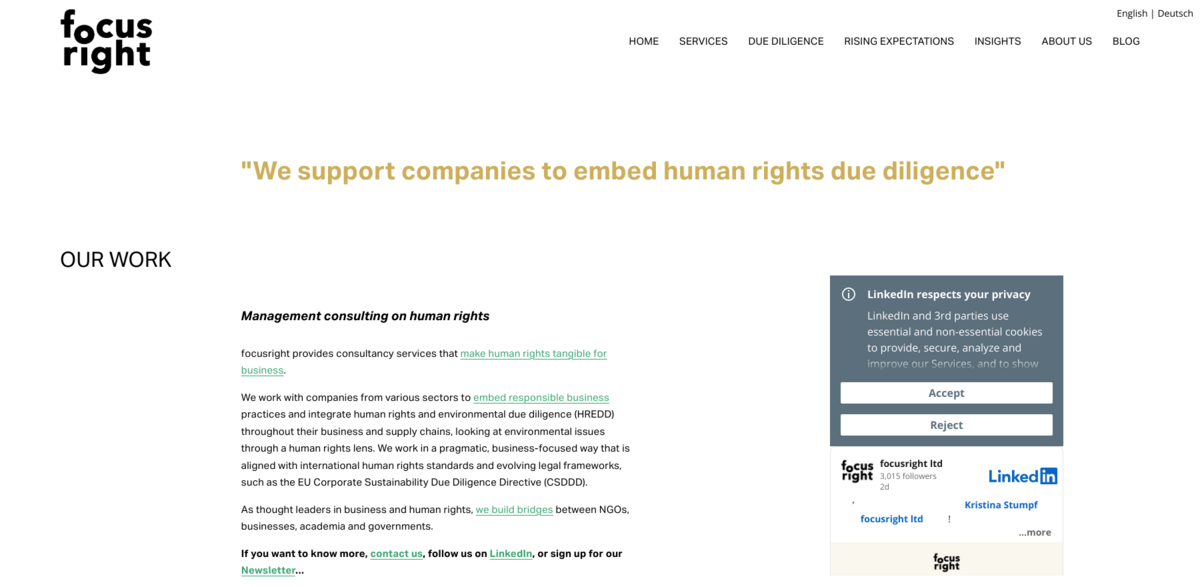Embedding Human Rights Due Diligence in Business
focusright supports companies in making human rights real and actionable within their operations. Their consultancy services help businesses from various sectors embed responsible practices and integrate human rights and environmental due diligence (HREDD) across their value chains. Looking at environmental issues through a human rights lens, focusright works pragmatically and business-focused, aligning with international human rights standards and evolving legal frameworks like the EU Corporate Sustainability Due Diligence Directive (CSDDD). Acting as thought leaders, they build bridges between NGOs, businesses, academia, and governments to foster collaboration and understanding.
Main Benefits of Human Rights Due Diligence
Companies engaging with focusright gain tailored support to identify and manage human rights risks effectively. Key benefits include:
- Defining clear HREDD strategies and building management systems for smooth implementation.
- Identifying, assessing, and prioritising human rights-related risks and impacts across operations and supply chains.
- Taking impact-oriented, risk-based measures to integrate human rights into daily business processes.
- Developing responsible supply chain strategies that focus on risk mitigation.
- Creating cultural change through training and capacity building for employees and suppliers.
- Fostering sector collaboration by connecting key actors to increase leverage on human rights and environmental risks.
- Conducting meaningful stakeholder engagement throughout the due diligence process.
- Establishing effective grievance mechanisms and ensuring access to remedy.
Common Human Rights Challenges in Business
Businesses face a range of human rights issues along their value chains. These challenges often include poor working conditions such as unpaid overtime, unsafe environments, or harassment. Modern slavery remains a critical concern, with forced labour, child labour, and exploitation of migrant workers still prevalent in some sectors. Companies also grapple with protecting child rights, ensuring children are not exploited or exposed to hazardous conditions. Privacy issues arise when personal data is mishandled or surveillance technologies are misused. Environmental pollution from business operations can severely impact the health and livelihoods of workers and local communities. Contentious land acquisitions may lead to forced evictions and violations of housing rights. Lastly, many companies struggle to ensure an adequate standard of living for workers, including decent wages, housing, and access to clean water.
Understanding Working Conditions and Modern Slavery
Working conditions can vary widely, but common issues include unpaid overtime, lack of protective gear, and harassment based on ethnicity. These affect fundamental rights like health, non-discrimination, and the right to peaceful assembly. Modern slavery is another grave concern—forced prostitution, child labour, and wage withholding are sadly still realities in some supply chains. Migrant workers often face passport confiscation and exploitative recruitment fees. These issues violate the right not to be subjected to slavery or forced labour and the right to freedom of movement.
Privacy and Environmental Concerns in Business
Privacy rights are increasingly at risk, with companies sometimes failing to protect employee or customer data. Practices like pregnancy testing during hiring or sharing information with authorities without legal basis violate privacy rights. On the environmental front, pollution from business activities can contaminate water, air, and soil, causing long-term harm to communities and ecosystems. This pollution threatens the right to a clean, healthy, and sustainable environment, as well as rights to life, health, food, water, and sanitation.
Project Impact on Sustainable Development Goals (SDGs)
- SDG 3: Good Health and Well-being
- SDG 5: Gender Equality
- SDG 6: Clean Water and Sanitation
- SDG 8: Decent Work and Economic Growth
- SDG 10: Reduced Inequalities
- SDG 12: Responsible Consumption and Production
- SDG 16: Peace, Justice, and Strong Institutions
- SDG 17: Partnerships for the Goals
Driving Change Through Stakeholder Engagement and Collaboration
Meaningful stakeholder engagement is key to effective human rights due diligence. Companies are guided to involve affected communities, workers, and other stakeholders throughout the process, ensuring their voices are heard and respected. Sector collaboration is also vital—connecting businesses, NGOs, and governments increases leverage to tackle systemic human rights and environmental risks. Through training and capacity building, companies foster cultural change internally and across their supply chains, embedding respect for human rights deeply into their operations.


















